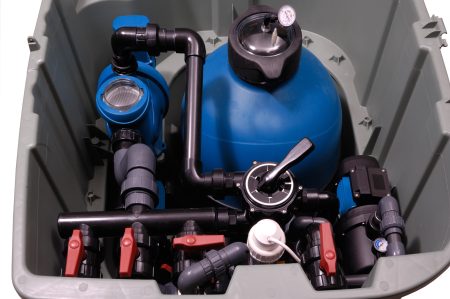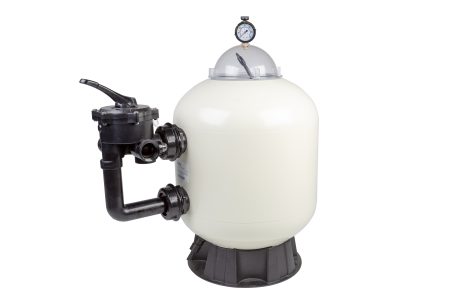Maintaining a sparkling, healthy pool takes more than just adding chemicals and skimming leaves. One of the most frequently asked questions by pool owners is: “Do I need to run my pool filter every day?” The short answer is yes, but the full explanation involves understanding how your filtration system works, how much runtime is necessary, and how to balance cost with efficiency.
In this comprehensive guide, we’ll explain why daily filtration is critical, how long you should run your pool filter, and smart ways to optimize energy usage, while ensuring your water stays clean, clear, and safe.
For filtration comparisons, read our article on Which Type Of Pool Filtration Is Better – Sand or Cartridges?
- What Does a Pool Filter Do?
- What Is a Pool Turnover Rate?
- Why You Should Run Your Pool Filter Every Day
- How Long Should I Run My Pool Filter?
- Calculate Your Pool’s Turnover Rate
- Is It Necessary to Run the Pool Filter 24/7?
- Energy-Efficient Tips for Running Your Pool Filter
- Monitor Water Quality and Filter Health
- Common Myths Debunked
- Conclusion: Yes, You Should Run Your Pool Filter Daily
What Does a Pool Filter Do?

Your pool filter plays a vital role in the circulation and sanitation of your swimming pool. It helps remove:
- Debris (leaves, insects, dirt)
- Contaminants (body oils, sunscreen, organic matter)
- Microorganisms (algae spores, bacteria)
Together with your pool pump, the filter continuously circulates water to prevent stagnation and ensure chemicals are evenly distributed.
What Is a Pool Turnover Rate?
A key concept in pool maintenance is the turnover rate, the amount of time it takes for your pump to circulate the entire volume of your pool through the filtration system once.
Most pools require at least one full turnover per day to stay clean and healthy. For most residential pools, this translates to running your filter for 8 to 12 hours a day.
Why You Should Run Your Pool Filter Every Day
Removes Debris and Contaminants
Daily filtration helps remove dirt, pollen, bugs, and leaves before they can settle, decay, and throw off your pool’s chemical balance.
Prevents Algae Growth
Still water is the perfect environment for algae to thrive. Continuous circulation prevents buildup and inhibits the growth of green, black, or mustard algae.
Even Distribution of Chemicals
Pool chemicals like chlorine, pH adjusters, and algaecides need to be evenly circulated to work effectively. Running your filter ensures they don’t concentrate in one area and become ineffective elsewhere.
Reduces Long-Term Costs
While running the pump uses electricity, insufficient filtration can result in cloudy water, algae outbreaks, and high chemical use, leading to more expensive maintenance in the long run.
How Long Should I Run My Pool Filter?
The ideal runtime depends on pool size, usage, climate, and equipment, but here are general guidelines:

Summer or Peak Season
- Recommended: 10–12 hours per day
- Elevated temperatures and increased swimmers require more filtration to maintain water quality.
Spring and Fall
- Recommended: 6–8 hours per day
- Moderate temperatures and debris from trees call for slightly reduced runtime.
Winter or Off-Season
- Recommended: 4–6 hours per day (if the pool is not winterized)
- Filtration needs are minimal during cold, inactive months.
Calculate Your Pool’s Turnover Rate
To determine exactly how long your pool filter should run:
- Calculate pool volume:
Length × Width × Average Depth × 7.5 = Total gallons - Check pump flow rate (GPM):
This is typically found on the pump label or manual. - Apply the formula:
Runtime (hours) = Pool Volume ÷ (Pump GPM × 60)
Example:
For a 20,000-gallon pool with a 50 GPM pump:
20,000 ÷ (50 × 60) ≈ 6.7 hours per full turnover.
To be safe, add 1–2 hours to account for real-world inefficiencies.
Flow rate calculator is available at Pool Flow Rate Calculator – Blue-White Industries
Is It Necessary to Run the Pool Filter 24/7?
While 24/7 filtration keeps water very clean, it’s often not necessary, and its energy intensive.
Pros of Continuous Filtration:
- Maximum clarity
- No stagnation
- Excellent chemical circulation
Cons of Continuous Filtration:
- High electricity costs
- Faster wear on pump and filter
- Often unnecessary for residential pools
A balanced approach of 8–12 hours daily is ideal for most pool owners. Use a programmable timer or variable-speed pump to fine-tune your schedule and save money.
Energy-Efficient Tips for Running Your Pool Filter
Here’s how to reduce energy consumption while still maintaining water quality:
- Use a timer to run your pump during off-peak hours!
- Upgrade to a variable-speed pump for flexible control and lower energy bills
- Clean filters regularly to avoid pump strain.
- Use a pool cover to reduce debris and water evaporation.
- Run your filter at night if electricity rates are lower.
Monitor Water Quality and Filter Health
Even with the correct runtime, water can become cloudy if:
- Filters are clogged.
- Pump pressure is too high.
- Chemical balance is off.
Pro tip: Backwash or clean the filter when the pressure gauge reads 8–10 psi higher than clean pressure.
Common Myths Debunked
Myth 1: “Running it less saves money.”
Truth: It can lead to dirty water, algae growth, and more expensive fixes later.
Myth 2: “I should run it 24/7.”
Truth: Not always necessary. Strategic scheduling can offer the same results for less energy use.
Myth 3: “8 hours works for everyone.”
Truth: It depends on pool size, usage, pump size, and environment.
Conclusion: Yes, You Should Run Your Pool Filter Daily
To sum it up:
Yes, you need to run your pool filter every day, ideally for 8 to 12 hours during swim season and fewer hours in off-seasons.
Proper daily filtration:
- Maintains water clarity.
- Prevents algae and bacteria growth.
- Distributes chemicals evenly.
- Saves you money on long-term maintenance.
With the right balance of filtration time, smart scheduling, and regular maintenance, your pool will stay sparkling, safe, and ready for swimmers, every day.
